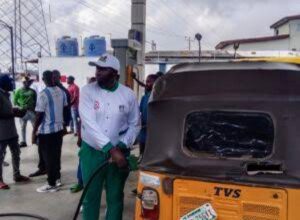

By Dada Ahmed in Lokoja.

(C) PM News Nigeria.
Despite a noticeable drop in petrol prices across Lokoja, Kogi State, transport fares in the state capital remain high,leaving many commuters puzzled and frustrated.
On Friday, residents who spoke with The Reporters expressed deep concern over what they described as a widening gap between the cost of fuel and the fares charged by commercial drivers, tricycle operators, and motorcycle riders.
A market survey conducted by our correspondent showed that many filling stations in areas like Total in NIPCO in Gadumo, and MRS in Phase I area sold petrol for between ₦895 and ₦899 per litre, down from the recent high of ₦1,050 to ₦1,120 per litre an 18 per cent drop.
Our correspondent nores that yet, these savings at the pump have not translated into relief for commuters.
For instance, a trip from Ganaja Village to Lokoja International Market still costs ₦500 on a tricycle, while a ride tricycle, other wise known as Kekenap,from the Post Office to Zango ranges between ₦400 and ₦500 instead of N300 few months ago.
Motorcycle operators have doubled their fare for short trips from ₦100 to ₦200 and could go as high as N1,000 or more, depending on the distance.
Our investigation also revealed that long-distance fares have seen even steeper hikes.
A journey from Lokoja to Okene now costs between ₦3,500 and ₦4,000, up from ₦2,000 and N2,500, while Lokoja to Kabba has jumped from ₦2,000 to over ₦3,000, while commuters plying Lokoja-Anyigba pay N4,500 or N5,000,depending on the vehicle and the driver’s discretion.
Tricycle operators such as Abu Mohammed, Aliyu Abubakar, and Sheriff Umar say the recent reduction in petrol prices is insignificant, compared to the overall cost of doing business.
“Unless petrol prices drop to at least, ₦500 per litre, we can’t reduce our fares,” said Aliyu Abubakar.
He noted that while petrol prices may be falling gradually, spare parts, maintenance, and the general cost of living remain high.
“A brand-new tricycle tyre that used to sell for ₦20,000 now costs ₦30,000. Even a simple spark plug is now more expensive. Most of us are using tricycles bought on hire purchase for up to ₦4 million, which becomes more expensive due to interest,”said Mohammed.
He expressed pessimism that until there is a holistic intervention in the transport value chain, commuters will continue to bear the burden of inflation,even when fuel prices ease.
Operators and commuters alike called on the federal government to take urgent steps to stabilize the naira, regulate the prices of spare parts, and create policies that encourage fair competition and protect the welfare of ordinary Nigerians.
“There should be a mechanism to check arbitrary price increases,not just in transportation, but in food and essential goods because we go to the same market with other members of the society where we are confronted with high prices of food stuffs and other commodities,”Abubakar stressed.
Economic analysts suggest that price monitoring bodies, local unions, and government task forces need to collaborate more closely to ensure market responses to fuel price changes are not hijacked by profiteering middlemen.
Transparency in fuel supply chains and incentives for operators who lower fares could also drive change.
Until then, residents of Lokoja, like many others across Nigeria, may continue to face the paradox of cheap fuel, costly transport,a burden on the shoulders of the already overstretched average commuter.


